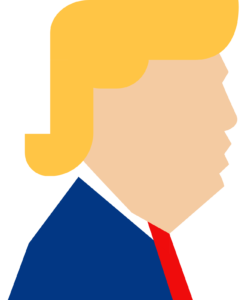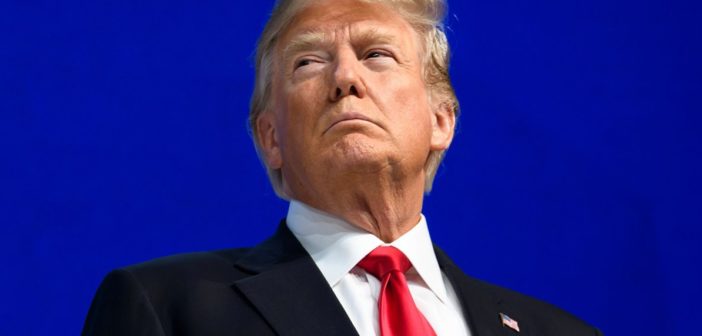By: Gracie Swind, Managing Editor
Although there is a chance we may not know who the next President of the United States will be on election night due to mail-in voting, we will all be given the chance to cast our votes and raise our political voices before the results are called. Ultimately, each individual will cast their vote for whichever candidate they feel better aligns with their beliefs and values, but for those of you still on the fence, here are some important reminders about the triumphs the U.S. has felt under the administration of our standing POTUS, President Donald J. Trump.
As of January 2020, the Trump administration added 6.7 million jobs to the economy and the unemployment rate reached 3.5 percent, the lowest it has been in half a century. According to information provided by the U.S. Bureau of Economic Analysis, during the first three years of Trump’s administration, poverty was trending down, average wage numbers were up, farm income was on the rise, and the stock market was flourishing at record levels.
In addition to leading the country to financial prosperity during the first three years of his presidency, President Trump has also proven himself as a capable leader abroad. Early in his time in office, Trump pulled out of the Trans-Pacific Partnership trade agreement, reducing the number of jobs leaving the country and taking the opportunity to seek and exploit cheap labor overseas from American companies that were utilizing the trade agreement to outsource jobs to cheaper workers.
Since Trump’s inauguration, the United States has also withdrawn the U.S. from the North American Free Trade Agreement (NAFTA), which was another such trade agreement that allowed American companies to outsource jobs and ferry goods across North American borders. NAFTA was replaced with a bilateral trade agreement called the U.S.-Mexico Trade Agreement, and under the new agreement, Trump added stipulations that required cars manufactured in Mexico to be built with at least 75 percent parts made in North America and placed higher requirements on wages for automobile manufacturing workers abroad.
In the middle-east, Trump pulled out of the United Nations Relief and Works Agency (UNRWA), citing that the U.S. was bearing a disproportionate share of the burden of UNRWA’s costs.
The Trump administration also retracted the U.S. from the Iran Deal, which Trump famously called “the worst trade deal in the history of trade deals, maybe ever.” At the time, it had become clear that Iran had not held up its end of the deal with the U.S., and had continued developing nuclear weaponry, despite the deal stating they wouldn’t; by cutting off the Iran Deal and putting more sanctions on Iran, Trump kept the pressure on foreign adversaries and made it clear that America would not be pushed around.
With the historic tensions between the United States and certain middle-eastern countries, it is critical for American leaders to give no quarter when dealing with outside threats. In addition to his withdrawal from the Iran Deal, President Trump proved his mettle in dealing with Iranian threats this January, when a U.S. civilian contractor stationed in Iraq was killed by a rocket attack from Iran; President Trump’s swift retaliation and cool level-headedness kept us from the brink of war.
In an interview conducted this January following the U.S.-Iran clash, Dr. Marco Rimanelli, a tenured professor in Political Science and International Security at Saint Leo University, said, “Because the Iranians have done many things before[…]and the Americans had not reacted because nobody had died, they took this not as a sign of restraint, but as a sign of weakness[…]Trump wanted to teach a lesson short of going to war. He took a gamble – he won[…]In the process, Trump has shown that he was strong, as well as very unpredictable, and that keeps scaring everybody.”
These strong shows of leadership from President Trump have regained international respect and deference for the United States and proven again and again that Trump puts the interest of the country first. However, many of Trump’s successes over the course of these past four years have recently been forgotten in the face of the COVID-19 pandemic, by the public and the media.
President Trump was dealt a bad bit of luck with the emergence of COVID-19 riding the coattails of his first presidential term, the effects of which unfortunately undid a lot of his hard work for the economy, job market, and stock market. I believe that Trump cannot be held fully accountable for the sudden recession that the country has been thrown into, however, I would be remiss not to mention that his actions or lack of actions did play a role in how COVID-19 affected the country in one way or another.
On Jan. 31, President Trump suspended travel into the country from China, and was immediately raked over the coals by the media, which labeled him and his travel suspension order xenophobic and racist. This was also around the time that Speaker of the House, Nancy Pelosi, made a spectacle of herself in San Francisco’s Chinatown, aiming to further shame President Trump for his order by framing it as a racial attack instead of a health precaution.
Downplaying the virus, which at the time had killed several hundred people worldwide and was spreading fast, Pelosi encouraged people to visit Chinatown, saying in an interview to NBC, “That’s what we’re trying to do today is to say everything is fine here.”
The simple truth of the matter is that Trump’s ban on travel from China for non-U.S. citizens saved lives; it was not a racial attack and was instead a precaution put in place to delay and lessen the spread of COVID-19 to the United States.
Eight days prior to Trump’s suspension being put in place, China locked down Wuhan, the source of the novel coronavirus, and imposed travel bans of their own, quashing all domestic travel internally to limit the spread among their own people. If China was recognizing the threat of COVID-19 in January and taking action to slow its spread, why couldn’t President Trump take similar action without it being construed as racist or xenophobic?
Later this year, in September, President Trump was quoted by Bob Woodward in his new book entitled, “Rage,” as saying, regarding the coronavirus, “I wanted to always play it down. I still like playing it down, because I don’t want to create a panic.”
Since then, the president has come under blast for admitting to intentionally down-playing the severity of the coronavirus, however, it should be clear that Trump was trying to avoid further riling up a country that was already panicking.
Remember, this was at a time when across the nation, fights were breaking out in supermarkets over who among us got to hoard the most toilet paper; necessities such as soap and certain food items were flying off the shelves and going completely out of stock all across the country, and in general, the public was panicking. By not stoking the fires of fear in what was already a nigh-uncontrollable blaze of panic, President Trump did what any good leader should do for his country in a time of crisis: reassure his people, try to give them hope, and remain outwardly positive and confident.
In the background, President Trump and his administration worked to combat COVID-19 and support the medical field as they researched and developed a vaccine by restricting travel, directing the manufacturing of ventilators, and signing in numerous acts and executive orders.
On March 11, Trump signed in an economic relief package that expanded free testing, Medicaid, and additional protective measures to health care workers. On March 18, with the signing of the Families First Coronavirus Response Act, Trump expanded the Supplemental Nutrition Assistance Program (SNAP) and Woman, Infants, and Children (WIC) programs by $500 million to help those under their protections who were affected by COVID-19.
Throughout the year, the effects of the Coronavirus, Aid, Relief, and Economic Security (CARES) Act, which was signed into law by President Trump on March 27, were felt by the country in the form of a $2 trillion package that included stimulus checks, support for small businesses, funding for state, local, and tribal governments, and job preservation efforts.
Quoting from the U.S. Department of the Treasury, “The CARES Act provides fast and direct economic assistance for American workers, families, and small businesses, and preserve jobs for our American industries.”
As they say, hindsight is 20/20, and it is easy to criticize Trump after the fact for actions he took when we were still not fully aware of what this crisis entailed. This final year of President Trump’s first presidential term has been shaky, but let us not forget all the prosperity that Trump brought to the country prior to the emergence of COVID-19.





